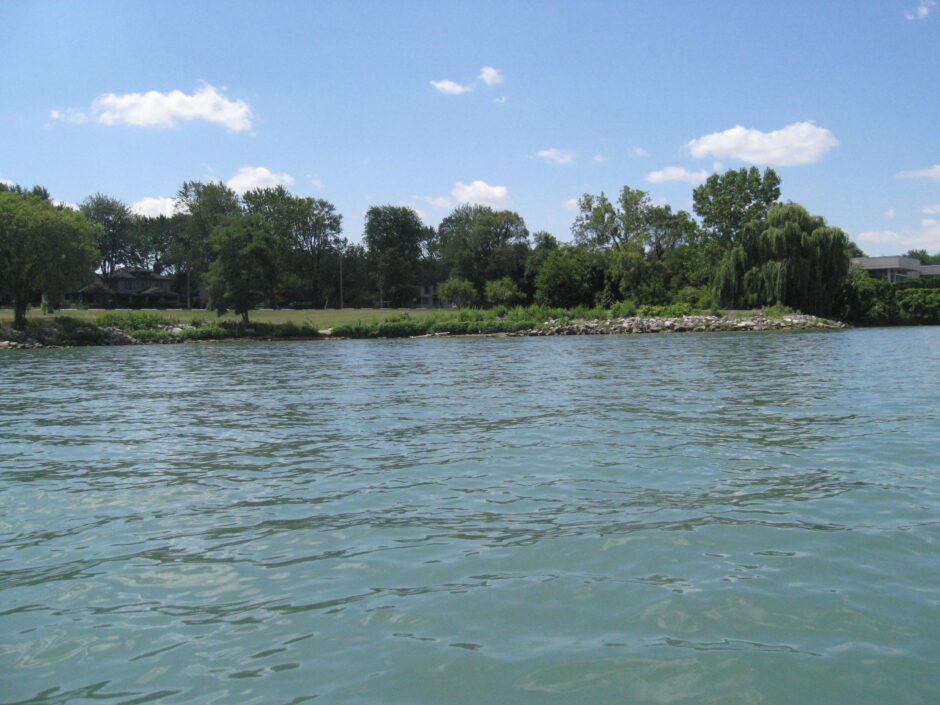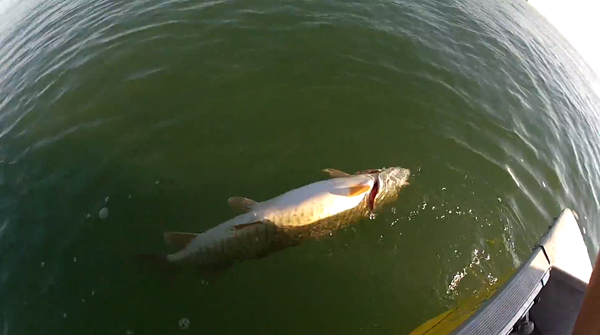Undersized Muskie in the Detroit River: How a Viral Video Exposed a Troubling Trend
 New gravel beach near downtown Windsor west of the Weeks fountain. It follows the Canadian shoreline, including parts of Peche Island. (Credit: jodelli via Flickr (CC BY 2.0)
New gravel beach near downtown Windsor west of the Weeks fountain. It follows the Canadian shoreline, including parts of Peche Island. (Credit: jodelli via Flickr (CC BY 2.0) September 6th, 2014, a video of a man killing and dumping an undersized muskie on the Detroit River went viral, stirring up an investigation and mobilizing online groups against the man in question. According to the Windsor Star, the video showed Eddie Parent bludgeoning an undersized muskie before throwing it back into the water.
Mike Cowley and Dane Alexander were actually fishing for muskie on the day of the incident and were the two who caught the event on camera. According to Outdoor Canada, the event took place on the 3rd, though the video was uploaded on the 6th. In the background of the video, Parent is seen throwing the dead fish into the water, and Cowley and Alexander discuss what happened as Parent’s boat is a bit too far to get a clear view.
The boat approaches the catch site and pulls the dead fish out of the water, showing that the fish is below the legal length, measuring about 38 inches, while the legal minimum at the time was 44 inches. The video also captures the expletive-dense dialogue Parent launches into when approached by the boat filming him.
When asked why Parent killed the fish, he states, “It’s a sh*t fish. It’s in here eating all the f*cking good fish.” Parent continues to argue with the two anglers on why he killed the fish, ultimately claiming that muskie eat the fish he wants, and so he kills them, despite Cowley and Alexander urging him to consider the legality and impact of his actions.
With video evidence and the pressure from the Ontario Ministry of Natural Resources investigation, Parent’s name was leaked rather quickly. Instead of laying low in the wake of the video, Eddie went to the Windsor Star and apologized for the incident in a video interview.
In the apology video, Parent states that he is sorry and that he is taking responsibility for the incident. However, Parent also wants to clarify that he isn’t the villain people have made him to be, stating, “This has never happened before. I don’t know why it happened—I can’t give you a reason why.”
As the initial video and apology went viral and Parent’s apology was shared, he was quickly painted as a villain against all fish, which prompted him to appear on CBC following his rise to infamy. In the interview, Parent affirms that his actions were wrong but states, “It had no chance of living. I did the fish a favor by what I did.”
He also calls into question the proportionality of the internet’s response. The video accompanying the interview includes screenshots of individuals threatening harm to Parent or calling for him to be killed like the muskie. Parent goes on to state that he is now recognized out in public for the incident as well.
Part of a Larger Problem
Along with the threats are countless comments applauding the two anglers who said something to Parent because this behavior may happen all too often. The unfortunate part of the event is that Parent’s actions give the rest of the angling community a bad name, a group that many resource management groups know to be ardent supporters of fisheries and conservation.
Such sentiments are shared by Cowley and Alexander (as well as many other anglers on a muskie forum) as they try to explain to Parent that muskie are part of the food chain and important to the ecosystem. They even try to convince him to stop by explaining that the action is illegal. Their points emphasize the need for fishing regulations that protect fish like muskies.
While the two anglers were game fishing for muskie, Parent was a few yards away catching and killing the prized fish. Size limits for muskie were created in order to ensure the population is secure—by allowing them to reach the minimum catch length, there is a higher chance the fish has had a chance to spawn, ensuring future generations of muskie. The fish are particularly slow-growing, taking around five years to reach spawning age.
Conclusion
Fortunately, Parent’s actions were followed by a charge and his pleading guilty as he “failed to release it in a way that caused the least harm to the fish,” according to the Windsor Star. Parent was forced to pay a $1,000 fine and banned from fishing for two years following the incident in 2014.
At the time of the original publication of this article (September 2014), Todd Willis, a fisheries research biologist at MNDR’s Lake St. Clair Fisheries Research Station, couldn’t say how prevalent Parent’s mindset is, but it doesn’t have much basis in reality.
“Among people who don’t know a whole lot about how a food web works, (muskie) have a reputation for eating all of the ‘more desirable [fish],’” he said. “If you have a balanced ecosystem with a balance of predator and prey base, they both keep each other in check.”
Vigilante ecosystem engineers are unlikely to make any significant dent in the population, according to Willis. That’s one good reason not to go indiscriminately killing muskie, but there’s also the real consequence of online communities holding violators accountable. Parent faced the reality of this, as he shared in his CBC interview.
“It’s totally senseless, in my opinion, because you’re illegally killing a fish,” Willis said.
Though several years old, the story still serves as a cautionary tale for anglers trying to reshape their favorite fisheries food chain, as well as highlighting the need for fishing regulations protecting game fish like muskies from being targeted.



Matt Fed
April 1, 2024 at 10:40 pm
Muskie are one of my favorite fish species, this is sad to see.